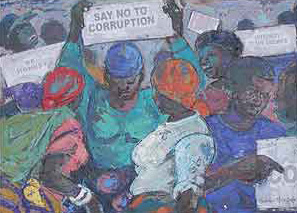 |
 |
 |
 Editorials | June 2006 Editorials | June 2006  
Coercion of Voters Still a Real Concern
 Kelly Arthur Garrett - The Herald Mexico Kelly Arthur Garrett - The Herald Mexico


| | A civic group has found evidence of vote-buying across Mexico. |
>Vote buying and coercion are usually identified with the fraudulent elections of Mexico´s 20th-century past. But they´re not dead yet, according to a prestigious citizens´ group.

In fact, the Fellow Citizens Committee to Monitor the Electoral Process found enough evidence of vote-buying in both the north and south of Mexico to constitute a "serious problem" that could affect the outcome of what may be an extremely close presidential vote on July 2.

"It´s no longer just the political parties and some unions or public servant in charge of social programs that are promising favors or making threats to get votes for a certain candidate," committee members said in a statement released at a press conference Wednesday.

"Now some companies are ... pressuring, inducing and coercing their employees to vote for one of the candidates."

Based on more than 4,000 interviews in 20 states, the committee said it found "worrisome tendencies" regarding vote buying and coercion. The typical modus operandi is to give poorer voters the impression that their social program benefits are tied to their vote.

The committee report pointed to relief programs for victims of last year´s Hurricane Stan in Oaxaca and Chiapas. Most of the aid is just now arriving, the report said, and "there is testimony that these resource are being used for electoral purposes by the three principal political parties."

Most of the complaints about attempted vote buying and coercion are related to Seguro Popular, the Fox administration´s signature health care program for poverty level Mexicans not enrolled in social security (IMSS). Procampo and Empleo Temporal, federal rural assistance and jobs programs, were also singled out as rife with abuse, as were many state programs.

For example, one of 20 citizen interviews reported being asked to attend a "meeting" in exchange for receiving social program benefits. One in 15 said they were directly threatened with losing their benefits if they did not vote for a certain party.

Other coercion tactics reported include arranging breakfasts with program beneficiaries on the morning of the vote, letting beneficiaries know they will be watched as they vote, and telling them that they will be picked up at their homes to be driven to their polling stations.

The states where the most potential problems exist are Chiapas, Oaxaca, Michoacán, Tlaxcala, the State of Mexico, Sinaloa, Durango, and San Luis Potosí.

The Fellow Citizens Committee to Monitor the Electoral Process consists of a dozen prominent intellectuals identified with pro-democracy work, including Sergio Aguayo, Alberto Athie, Denise Dresser, Cecilia Loria, José Antonio Crespo, Miguel Basáñez and Rodolfo Tuirán. | 
 | |
 |



